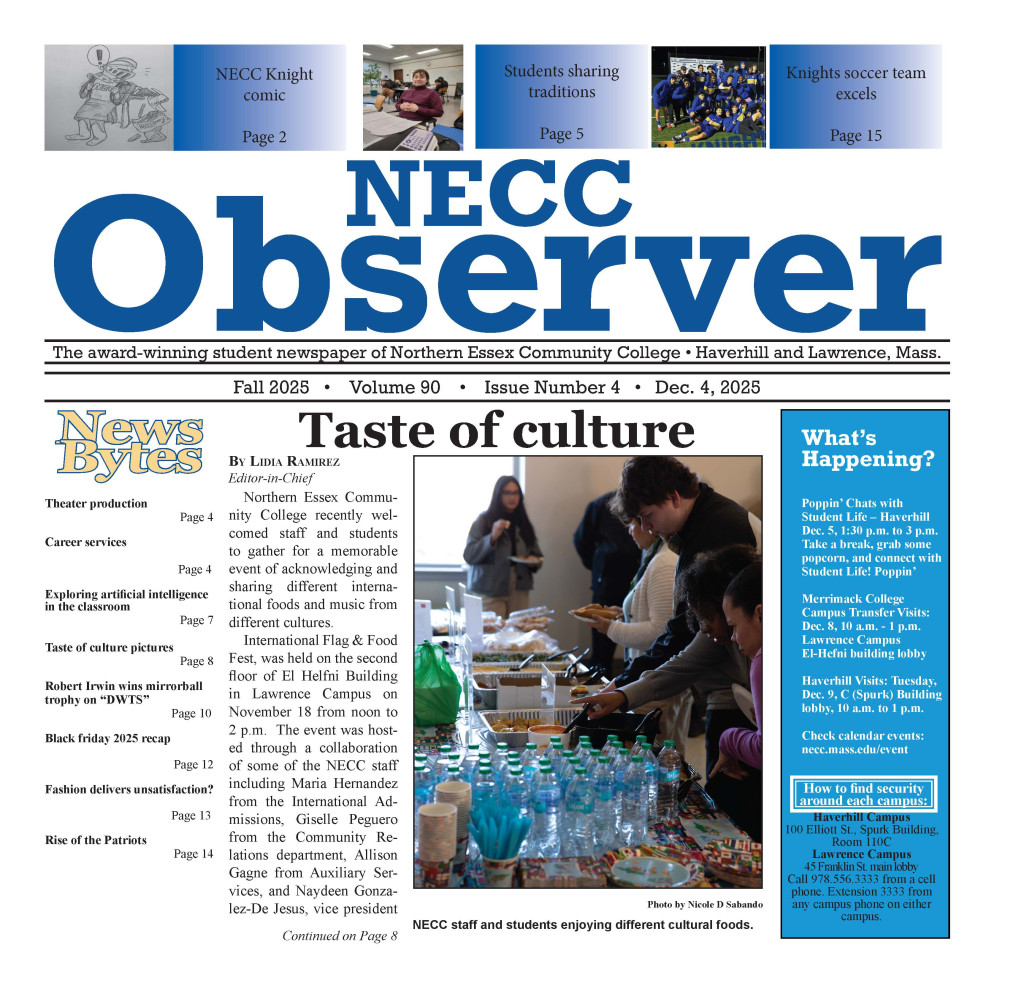COVID-19 continues to tear through the world, through the United States, and through Massachusetts. It continues to reach and affect people throughout the Haverhill community, and in other surrounding communities. And since the pandemic first reached this area, it has hit home for numerous college and high school students, like Sabine Smith, Jason Curry, and Hannah Longo.
The coronavirus has affected over 35.8 million people worldwide. Around one million people have died. In the U.S alone, around 7.53 million people have contracted the virus and more then two hundred thousand have died. In Massachusetts, the total number of cases is around 130,000, and the number of deaths is up to 9,500.
In Essex County, Mass., which includes cities like Haverhill, there are about 20,600 with 1,300 deaths.
Back in March, lockdown had just begun, nobody was really aware of how destructive the virus actually was.
Sabine Smith, a student at Northern Essex Community College, said she had not been taking the virus seriously at all.
“School had closed down, but nobody was sure for how long. I think I thought the virus would pass us by,” she said. “I was following protocols and everything, but I was sort of oblivious to what was going on. I’d be texting or facetiming my friends, and we’d just be joking about everything. It was funny to us. Being on social media was like that too. Everyone was making jokes and acting like it wasn’t a big deal, so I wasn’t worrying about it.”
Her mindset changed quickly, however. Just a few weeks into quarantine, Smith learned that her grandfather had contracted the coronavirus.
“I remember my mom told me, and I just didn’t believe her. I had the idea that it wasn’t going to happen to anyone I knew,” she recalls. “I was worried. But I also didn’t want to tell anyone else. I feel like there was a stigma around the virus at that point in time.”
It was an excruciating time for her and her family. Her grandfather, and her grandmother, who did not test positive but quarantined with her grandfather, were both in the age bracket of those most heavily affected by COVID-19. At the time, the virus was still emerging, and so nobody knew much about it. Smith remembers how terrifying the whole thing was. She, along with the rest of her family, had to quarantine for two weeks, but they did not have the virus. Everyday, they would check in with her grandparents, and would drop things off at their house.
“Thankfully, they weren’t super sick from it, but it was still worrying.” said Smith. “My grandparents have always been really healthy, so it was hard for everyone to adjust. Thankfully, they were only sick for about two weeks, and it doesn’t seem like they have any lasting effects from it. I know that they were incredibly lucky.”
The social aspect was hard for her family. Her grandparents live close by, and they are always seeing them, so to be cut off like that was hard on both ends.
The stress of being separated from a loved one under such uncertain circumstances is a struggle for many people, and it hit Jason Curry, an Essex-Technical High School student, especially hard. Prior to the pandemic, his older brother had been traveling quite a bit, and he had been unable to see him. His brother had been in Europe from January, was supposed to come home in March, but held off due to the virus.
“He came back in April. He had to get tested, and then we found out he had COVID. It was like we barely got to see him.” said Curry. “We’d all been really missing him, and then as soon has he got back, he had to quarantine in his apartment.”
His brother was alone during his whole period of quarantine. Curry’s mother had been going to check on him, but then she tested positive, and the whole family had to quarantine.
“At that point, I don’t think they were testing people unless they showed symptoms. My mom started showing symptoms, so she got tested and she was positive. Everyone else in my family was asymptomatic, so we didn’t get tested. The doctors told us to just stay home for two-three weeks, and if we started showing symptoms, we should get tested.” Curry remembers. “It was hard because my school had just made the transition to online, and I was trying to focus on that, and I was also trying to facetime my brother, because I wanted to make sure he was doing okay. It was hard to talk to him though, because he was really tired. It was just upsetting because none of us had seen him for so long, and then he immediately got sick. But I’m just grateful nobody in my family got super sick, because a few friends of mine actually lost people to the virus”.
Curry said that being directly affected by COVID changed his perspective on the virus. Before his family members got it, he had thought people were overreacting about it.
“I didn’t really believe that the virus was that serious. But then, you actually see what it does first hand. I wish I hadn’t underestimated it before,” said Curry. “I’m glad that everyone was able to recover, but I feel stupid for disregarding the virus before.”
Hannah Longo, a junior at Pentucket Regional High School, was also skeptical about the virus. And then she saw how dangerous it actually was. Longo’s cousin had been traveling overseas. She returned in late March, and soon after, began exhibiting COVID symptoms.
“I’m not that close with that side of my family. I was concerned, but my cousin was doing okay,” said Longo. “Then it turned out that basically all my aunts, uncles and cousins on that side of the family tested positive. I had no idea that the virus was like that.”
Longo’s immediate family had not been in contact with any of the members who had tested positive, so they were not worried about contracting the coronavirus themselves. They were worried, however, about Longo’s grandparents. They had been in contact with the positive family members. Her grandparents were elderly, and both had multiple pre-existing conditions.
“We found out they were positive about a week after my other family members tested positive. Within a few days of them testing positive, they were both in the hospital.” said Longo. “It was really horrifying. They were doing fine, and then immediately, they were on ventilators. It was really shocking.”
A week after testing positive, Longo’s grandfather passed away. Only a few days later, her grandmother passed as well
‘It was awful.” Longo recalls. “It had only been a week or so, and the virus acted so quickly”.
It was hard for Longo. She had not seen her grandparents for quite awhile, and it upset her that nobody had been able to say goodbye. She had to try to do her best in her online classes, and try to help out her family members.
“It was tough because we couldn’t have a funeral, we couldn’t properly say goodbye,” said Longo. “It was hard to move on, because we couldn’t do any of the things that people do to move on.”
Longo’s family eventually held a small memorial service, which she feels helped them get through. Her family began to recover from the shock, and the trauma.
“It’s still hard, but slowly, we’ve been managing.” Longo said. “I wanted to add that before this happened, I was unaware of how devastating the virus was, but now I’m trying my best to follow the protocols and stay up to date on the information surrounding the pandemic. I just wish it hadn’t taken the loss of my grandparents to make me see that.”
For these three students, the effects of the virus showed them its seriousness.
But they are worried that others who were not directly affected still do not understand.
“I’m glad not everyone has to go through this,” said Longo. “But that’s why I’m glad to share my story. I want to help educate those who may have been like me. I know many people feel like the pandemic won’t affect them, but I want them to see what it can really do. It is still present in our community, and it can still affect you or your family members.”


